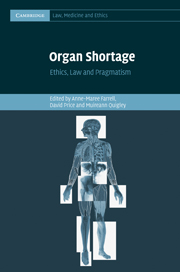Book contents
- Frontmatter
- Contents
- List of figures
- List of tables
- Contributors
- Acknowledgements
- List of abbreviations
- Table of cases
- Table of legislation
- Part I Setting the scene
- Part II Current issues affecting organ shortage
- Part III Strategies for addressing organ shortage
- 6 Incentivising organ donation
- 7 Making the margins mainstream: strategies to maximise the donor pool
- 8 The allocation of organs: the need for fairness and transparency
- 9 Ante-mortem issues affecting deceased donation: an ethico-legal perspective
- Part IV Comparative perspectives
- Part V Current reform and future challenges
- Bibliography
- Index
6 - Incentivising organ donation
from Part III - Strategies for addressing organ shortage
Published online by Cambridge University Press: 29 March 2011
- Frontmatter
- Contents
- List of figures
- List of tables
- Contributors
- Acknowledgements
- List of abbreviations
- Table of cases
- Table of legislation
- Part I Setting the scene
- Part II Current issues affecting organ shortage
- Part III Strategies for addressing organ shortage
- 6 Incentivising organ donation
- 7 Making the margins mainstream: strategies to maximise the donor pool
- 8 The allocation of organs: the need for fairness and transparency
- 9 Ante-mortem issues affecting deceased donation: an ethico-legal perspective
- Part IV Comparative perspectives
- Part V Current reform and future challenges
- Bibliography
- Index
Summary
The number of people on the waiting list for organ transplants dramatically exceeds the number of organs available for transplantation. There is ongoing debate about how best to tackle this problem as the chapters in this book demonstrate. The optimal solution may be the implementation of medical and public-health measures which aim to reduce the number of individuals who find themselves in need of an organ transplant in the first place. In the meantime, however, we need to find a way to increase the numbers of organs available for transplantation. In order to do this, we have to motivate individuals to donate their organs either while alive or after their deaths. A way to achieve this may be to offer individuals or their families some kind of incentive to donate.
One suggestion that has been made for increasing the supply of organs for donation is to allow a market in organs. Proposals along these lines generally refer to markets in living organs or, more specifically, live kidney sales. However, I am not going to deal with the ethics of such a market here. The arguments relating to markets in this respect have been well-rehearsed elsewhere. The fact also remains that the sale of organs is illegal in most countries. However, as will be seen there is an increasing call for both financial and non-financial incentive schemes to be used in order to encourage people to donate their organs for transplantation.
- Type
- Chapter
- Information
- Organ ShortageEthics, Law and Pragmatism, pp. 89 - 103Publisher: Cambridge University PressPrint publication year: 2011
- 2
- Cited by



